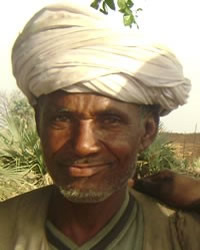Fulani, Bagirmi in Central African Republic

Photo Source:
Anonymous
|
Send Joshua Project a map of this people group.
|
| People Name: | Fulani, Bagirmi |
| Country: | Central African Republic |
| 10/40 Window: | No |
| Population: | 240,000 |
| World Population: | 292,000 |
| Primary Language: | Fulfulde, Bagirmi |
| Primary Religion: | Islam |
| Christian Adherents: | 0.10 % |
| Evangelicals: | 0.03 % |
| Scripture: | Portions |
| Ministry Resources: | No |
| Jesus Film: | Yes |
| Audio Recordings: | No |
| People Cluster: | Fulani / Fulbe |
| Affinity Bloc: | Sub-Saharan Peoples |
| Progress Level: |
|
Introduction / History
The Bagirmi Fulani are a sub-group of the much larger Fulani, a tribe that is spread across much of West Africa. It is thought that they came from North Africa or the Middle East as herdsmen centuries ago. The Fulani are grouped and named according to their locations and occupations. The Bagirmi Fulani are a branch of the Fulani who occupy the Bagirmi region of south-central Chad. They have also spread eastward and are now in parts of the Central African Republic. Their language, Bagirmi Fulfulde, belongs to the West Atlantic branch of the Niger-Congo language family.
What Are Their Lives Like?
Combining farming with herding, the Bagirmi Fulani are semi-sedentary herdsmen. Unlike some other Fulani groups whose families travel with them, the Bagirmi Fulani maintain a home where they live for half the year. During the dry season, when grazing ground and water are scarce, they take their cattle from the homestead in search of greener pastures.
The head of the family, along with his wives and younger children, usually stay at home and tend to a small herd and the crops. The young married sons and their families leave with the rest of the cattle. Hence, the Fulani can move when they desire and can also pay kinsmen and laborers to tend to the home vegetable gardens. In this way, they can be rewarded and enriched by both herding and farming.
At the homestead, agriculture provides for the livelihood of the people, with pearl millet and sorghum as the staple crops. They also grow corn, beans, peanuts, melons and cucumbers. Horses, sheep, goats, chickens and dogs are kept at the family farm, and wild rice is gathered from the fields by the women.
Family lineages settle in the same village and form family compounds. Polygyny (the practice of having more than one wife) is commonly practiced. A bride is sometimes picked according to the number of cattle she possesses since cattle are a symbol of wealth among all Fulani.
At the markets, the Bagirmi Fulani trade their dairy products for grain, farm equipment, and cloth. The market also serves as a place for social gatherings. Village dances and ceremonies are held in the market.
What Are Their Beliefs?
The Fulani were one of the first groups in Africa to convert to Islam. Today, the Bagirmi are almost exclusively Muslim. However, they still continue to practice many of their old Fulani traditions. To a Fulani, the important things in life are family, cattle, strong morals, and beauty. They also value an excellence in poetry, singing, and dancing. Bagirmi The Fulani are expected to follow a code of high moral behavior known as Pulaaku. Pulaaku extols virtues such as kindness, bravery, patience, tolerance, perseverance, honesty, diligence, generosity, and dignity. To be reserved is part of being dignified; thus, they are shy and modest in public. A mother does not show affection to her infant son. In fact, she never even calls her firstborn by his name all throughout his life.
To the Bagirmi Fulani, children are symbols of the future. For this reason, a special ceremony is held to celebrate the birth of a firstborn son and the naming of a son. The Fulani do not believe in an afterlife. Instead, they believe that a person lives from generation to generation through his children. With a son, a man's name and features will remain. Thus, if a Fulani dies without any children, he is believed to have died twice.
What Are Their Needs?
Veterinarians who follow Christ can help this Fulani subgroup by helping them find the ravishes of the tsetse fly. That would earn them a hearing about the glory of the Lord.
Prayer Points
Ask the Lord of the harvest to send dedicated evangelists, pastors and disciplers to live and work among the Bagirmi Fulani in the Central African Republic.
Pray that God will give the few Bagirmi Fulani believers opportunities to share Christ with their own people.
Ask the Lord to raise up strong Christian fellowships among the Bagirmi Fulani.